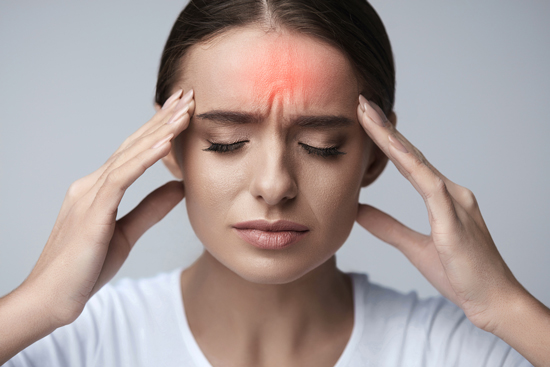Scientists have found a link between migraines and anxiety. How to stop the vicious cycle

Intense throbbing, dizziness, and nausea are effects you’ve probably endured if you’ve been victim to a migraine attack.
But if you’re experiencing migraines more often than expected, you might want to start off with finding a solution to calming your anxiety.
A National Defense Medical Center study found that migraines are linked to the severity of bouts of anxiety and depression.
The scientists tested a group of 588 participants who were patients of a headache clinic, and found that the worse their anxiety and depression symptoms were, the more frequently they had migraines. Talk about a stress headache!
Researchers also found that restless sleepers were more prone to headaches and migraines. Just another reason to get some decent shut-eye every night.
On a more positive note, there is still hope to banishing those terrible migraines. The authors suggested that if migraines are treated “preventatively”, you’re less likely to experience anxiety and depression as severely and frequently.
So how exactly can you do this?
The preventative treatments you need to know
While painkillers might be your go-to solution when your migraine is present, these healthy lifestyle tips can help in reducing the frequency and severity of migraines:
• Establish a regular sleeping pattern, making sure you get the recommended 7-8 hours of sleep;
• Eat at the same time every day, making sure not to skip meals;
• Avoid foods that are high in sugar or caffeine – such as aged cheese, chocolate, caffeine and alcohol;
• Exercise regularly, but not too vigorously;
• Practice meditation or HATHA YOGA to calm your mind and relieve stress;
• Stay hydrated;
• Avoid too much technology time.
What causes migraines and headaches?
There are four stages of a migraine: prodrome, aura, attack and post-drome, however not everyone experiences all of them.
Prodrome
This occurs one or two days before a migraine and effects can include:
• Constipation;
• Mood changes;
• Food cravings;
• Neck stiffness;
• Increased thirst and urination;
• Frequent yawning.
Aura
The effects are usually visual or sensory disturbances that build up over several minutes and can last for up to 20 to 60 minutes. Symptoms can include:
• Vision loss;
• Pins and needles;
• Weakness or numbness in the face or one side of the body;
• Difficulty speaking;
• Hearing noises or music;
• Visual phenomena;
• Uncontrollable movements such as jerking.
Attack
The frequency of the attack varies from person to person, but you may experience:
• Blurred vision;
• Light headedness;
• Sensitivity to light, sound, smell and touch;
• Throbbing or pulsing pain;
• Pain on both sides of your head.
Post-drome
You may feel drained and washed out after a migraine attack, and can experience the following for about 24 hours after the attack:
• Confusion;
• Moodiness;
• Weakness;
• Sensitivity to light and sound;
• Dizziness.
If you’re experiencing frequent or severe migraines, keep a diary of your attacks and schedule an appointment with your doctor.
yogaesoteric
November 10, 2018
Also available in:
 Français
Français
